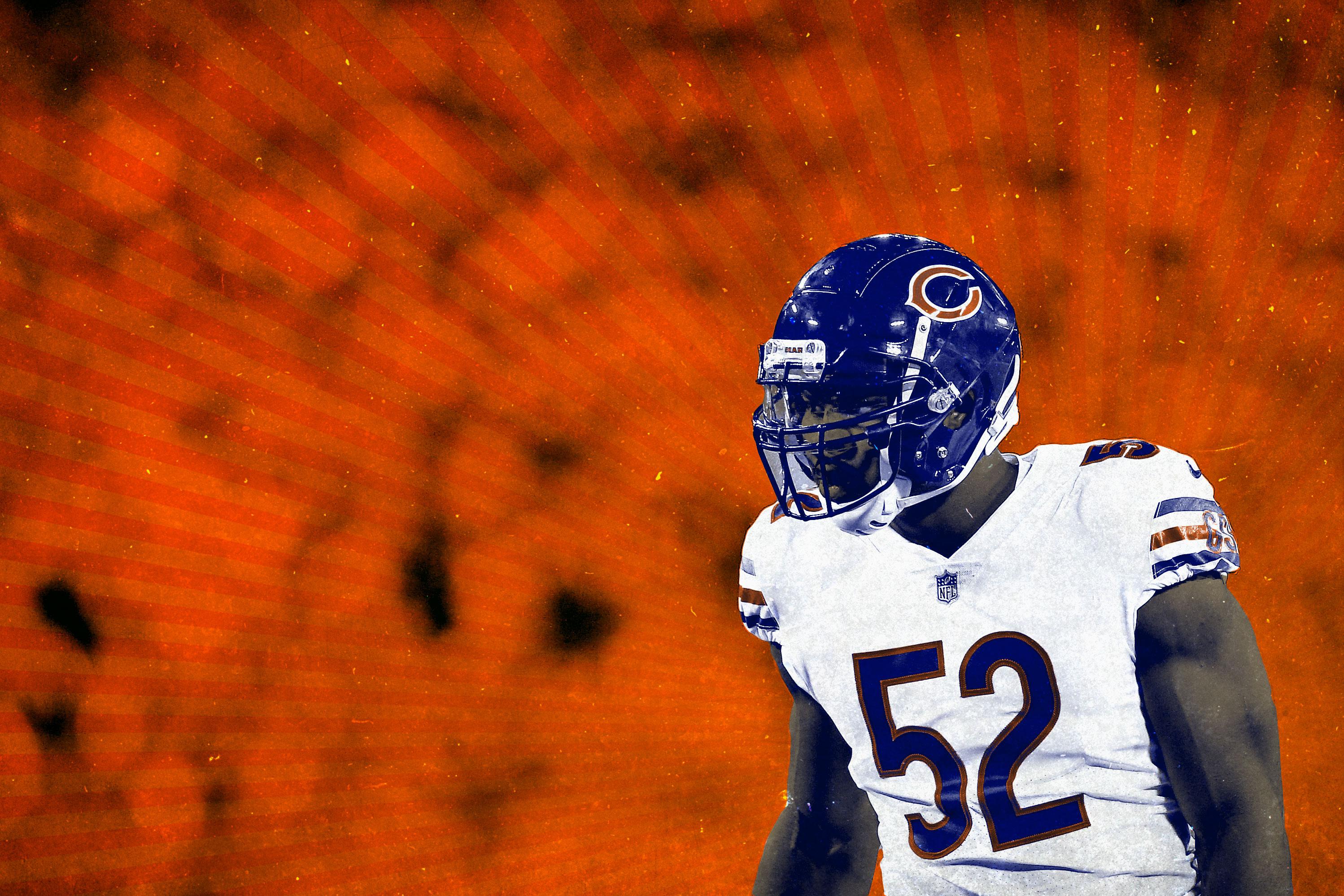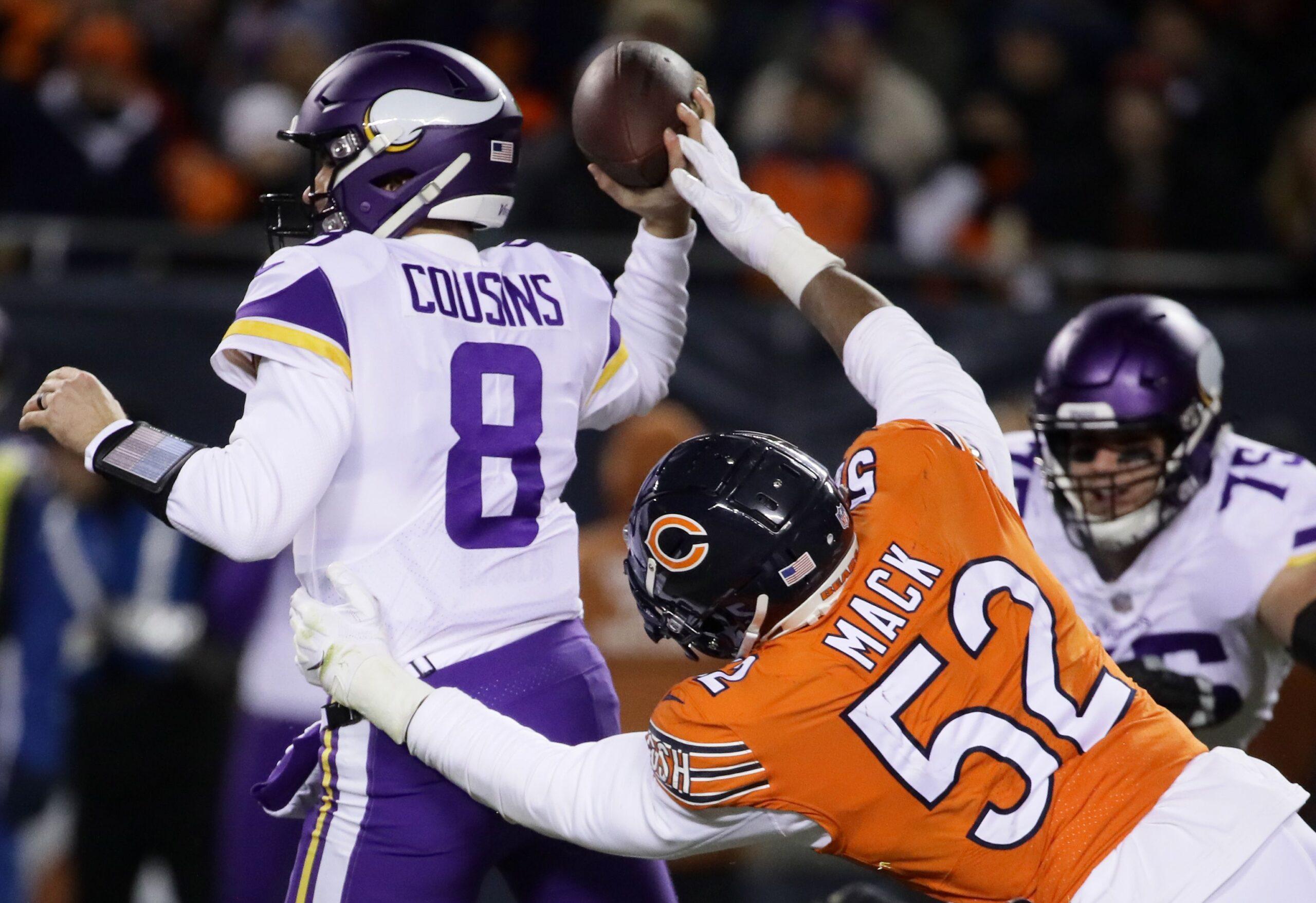
As fans trickled out of Soldier Field late Sunday night and began their cold walk through the tunnels outside the stadium, the smells and sounds were those of a pivotal Bears win. Cigar smoke hung in the air, and amid chants that “Green Bay sucks” were scattered cries of “First place!” By knocking off the Vikings 25-20 on Sunday Night Football, the Bears moved to 7-3 and gained a stranglehold on the NFC North. Much like it has all season, Chicago’s defense controlled the game, and Khalil Mack led the way.
The superstar pass rusher set up shop in Minnesota’s backfield for almost the entire first half, and he wreaked havoc all night. On the Vikings’ second drive of the game, Dalvin Cook took a first-down handoff at the Chicago 14-yard line and made his way toward the left tackle before Mack tossed tight end Kyle Rudolph aside, stripped the ball, and recovered it to snatch likely points off the board. In the second quarter, Mack darted into the Minnesota backfield and hit quarterback Kirk Cousins as he threw, nearly causing an interception by Bryce Callahan. And after a Mitchell Trubisky pick gave Minnesota a short field late in the third quarter, Mack pulled Cousins down for a sack on a first-down stunt to back up the Vikings offense and eventually force the visitors to settle for a field goal.
Even when Mack wasn’t directly involved in the play, he influenced every move the Vikings made on offense. His presence alone is enough to speed up the clock in any quarterback’s head, and Cousins pulled the rip cord early on plenty of throws, including a second-quarter pass that was intercepted by safety Adrian Amos. The Vikings scored 20 points and gained 268 total yards, but 150 of those came in the fourth quarter with the outcome all but decided. When the game mattered, Mack and friends owned the Vikings.
With the win, the Bears now hold a 1.5-game lead over Minnesota in the standings, and at 4-5-1, the Packers would have a mountain to climb to catch them. The addition of Mack has propelled Chicago to the division lead—and in turn, the preseason move to land him has become the most instantly impactful NFL trade of the decade.
Considering the league’s current trade-happy ways, that may seem like a stretch. But at this point, it’s hard to deny. The Seahawks’ deal for Marshawn Lynch in 2010 eventually transformed the franchise, but Beast Mode averaged just 3.5 yards per carry in his first regular season with Seattle before his famous earth-shaking run in the playoffs. Kansas City traded for Alex Smith in 2013, which lifted the Chiefs to competency, but the combination of Andy Reid, Jamaal Charles, and a stout defense fueled that surprise playoff push. The Mack trade was the Bears’ second deal in the past nine years that involved coughing up two first-round picks, but Jay Cutler’s arrival from Denver in 2009 didn’t really pay dividends until the following season (and even then, at what price?). Not since the Patriots traded for Randy Moss in 2007 has a player meant this much to his new team this quickly.

Mack may not be turning the Bears defense into a historically dominant group the way Moss did in New England, but he has unlocked his new unit in a similar way. Every member of Chicago’s secondary is having the best season of his career. And as offenses slide protection or chip Mack in an effort to keep him away from the quarterback, the remaining members of the Bears’ front four have seen one-on-one opportunities they otherwise wouldn’t have. Defensive tackle Akiem Hicks added another sack on Sunday night, bringing his season total to four, and outside linebacker Leonard Floyd bothered Cousins into bad throws on multiple occasions.
The entire defense’s energy has been ratcheted up by Mack’s addition. This group doesn’t just want to take the ball away; they feel it’s their right to have it. The way Eddie Jackson immediately turned his attention toward the goal line after he picked off Cousins in the fourth quarter made it clear that this defense believes that it deserves to score. That mentality is reminiscent of the great Bears defenses of this century, when the likes of Brian Urlacher, Charles Tillman, and Mike Brown felt they were entitled to the end zone.
With Mack firmly entrenched as this unit’s driving force and the team staying healthy thus far, the Bears have evolved into the NFL’s most game-changing defense. The looming question, though, is whether a buzz-saw unit like Chicago’s really matters in 2018.
The logical comparison for these Bears is the 2017 Jaguars. Both teams featured the league’s stingiest defense—and a quarterback who kept the fan base up at night. Even with those connections, though, this Bears offense is considerably better than the Blake Bortles–led Jags. Chicago entered Sunday night’s game ranked seventh in the league in passing DVOA. Mitchell Trubisky had a terrible night against Minnesota that included several maddening near interceptions and two picks that elicited a Michael Scott–esque, “Why are you the way that you are?” response. Yet for a quarterback starting his 22nd NFL game and just his 10th in an advanced offensive scheme, those sorts of missteps are expected against a complicated Mike Zimmer defense. And as much as both Trubisky and Bortles use their legs as a crutch, Trubisky’s rushing ability has been a weapon for Chicago’s offense (he added 43 more rushing yards on Sunday, bringing his season total to 363).
Quarterbacks aside, what truly sets this year’s Bears and the 2017 Jaguars apart is the rest of the offense. Armed with a varied collection of pass-catching options, head coach Matt Nagy has schemed this group to potency, even with Trubisky’s occasional struggles. That system was on full display on Sunday night. Chicago had 15 first downs in the first half, 12 of which were converted on first or second down. In fact, the Bears faced only five third-down plays total over the first three quarters. While Jacksonville used Leonard Fournette to grind the game away in the hopes of getting to third-and-3 last season, the Bears do their best to avoid the down entirely.
Nearly every Chicago pass catcher picked up a crucial first down on Sunday night. The Bears’ revamped collection of weapons has flourished in Nagy’s offense. Tarik Cohen toyed with linebackers in space. Trey Burton picked up a big gain on a tight end screen, and while it may have been negated by penalty, it illustrated the dimension he brings to Chicago’s attack. Rookie wide receiver Anthony Miller scored yet another touchdown, on a well-placed throw by Trubisky on the run. Allen Robinson hauled in a key third-down reception that kept the game-sealing drive alive. If Jacksonville had this offense in last year’s AFC championship game against New England, the Jags would have been the ones facing off with Philadelphia in the Super Bowl.
Thanks to Mack, Chicago has a defense that can rival last year’s Jags. And similar to that Jacksonville unit, this Bears group has no holes. It features a pass rush that torments opposing quarterbacks, and a secondary that lurks in the depths waiting for its shot to snatch the ball away. It’s an 11-man boa constrictor, ready to gradually crush opponents as the clock drains.
But for as close as the 2017 Jags got, that was last year. Over the past 12 months, the sport has undergone a paradigm shift. Eleven quarterbacks are on pace to throw at least 35 touchdown passes, Trubisky included. The NFL record for total points in a single season is certain to be shattered. Against an offensive juggernaut like the Saints or Rams—on the road, no less—Chicago’s defensive prowess could all be for naught. As the league’s points explosion takes hold, a divisional-round playoff game might be a race to 30, whether Mack is on the field or not. Like the Bears, both L.A. and New Orleans have weaknesses. The difference is that Chicago’s shortcomings come on offense. If the Bears do make the playoffs and get their shot at taking on the NFC’s royalty, it will set up as a true test of whether a great defense can be relevant in the modern NFL.
Those are questions for another day, though. As the horde of Bears fans made their way through Chicago’s Museum Campus on Sunday night, fears of what Trubisky might look like in the playoffs weren’t on anyone’s mind. The Willis Tower’s spires were lit orange and blue in the crisp November night. And a boy too young to remember the great Bears defenses of old whispered to his mom that this was the best game he’d ever seen. For now, Mack and a vintage Bears defense have reinvigorated a city’s dormant love for football. Chicagoans are ready to believe, broken hearts be damned.